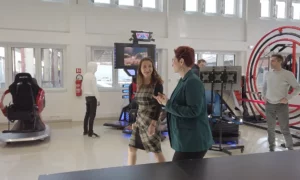(Editor’s note: This post on accelerators and incubators is part of our Tech Tuesday series. We’ll have a second list for 2018 as more accelerators and incubators come on-line.)
We were looking into our crystal ball one day back in 2016 and saw that a crazy man was going to take over America. No, really. That crazy man was going to bar millions of highly skilled internationals in the name of “Making America Great Again.” Some significant percentage of those already there were going to flee to a safe and secure collection of high-functioning countries collectively branded as “Europe.”
A goodly number of these people would be coming from innovation centers such as The Valley, Boston, Austin and New York. And they would bring not just incomparable skills and entrepreneurial drive to Europe, but some great ideas for the new, new thing.
The most ambitious would need great startup accelerators.
There you have it: That’s why we’ve put together a whole new list of accelerators and incubators in Europe, because startups and scale-ups are a great option for ambitious highly skilled internationals.
A lot has changed since our first list. Some of the accelerators we included in 2017 morphed into something else, including Cocoon Network, which became a shared workspace network and investment vehicle for China. Some are in the process of rebooting as in the case of Berlin Startup Academy.
The bottom line: Europe still hasn’t really found its secret startup sauce compared to Y Combinator and other U.S. accelerators.
If you just peruse the list of Y Combinator alums, it’s scary:
Airbnb, Dropbox, Stripe, Reddit, Just Spotted (acquired by Google) and more than 1,700 other startups funded
The good news is, Europe is getting more entrepreneurial, there are several new accelerators in Europe and some of the stalwarts just keep getting better.
EIT Digital, various cities
We’re putting this one first, because the application window for the EIT challenge closes in a few days.
If Europe ever does become the digital innovation capital of the world, it will be in part because of EIT Digital.
European Institute of Innovation and Technology is the umbrella organization for EIT Digital and has a significant network. This is an ambitious effort – educational as well as entrepreneurial – backed by a number of universities and corporations across Europe. Corporate partners including British Telecom, Philips, Airbus, Ericsson, Nokia and Siemens. University partners including technical universities in the Netherlands, France, Italy and the Scandinavian countries. You can see the full list here.
So what’s so great about EIT Digital?
Well, they have several programs including:
• A scale-up accelerator. The accelerator focuses on access to markets and access to capital on the way to raising a multi-million euro A-round. Since 2012, the EIT Digital Accelerator has supported more than 230 startups from different European countries access new markets and helped them raise more than 80 million euros in investment to date, according to the website.
• There’s also an EIT Digial Startup Challenge. A cohort of 25 scale-ups in five categories will be selected to pitch their product/service in front of an international jury of corporates and investors at the final EIT Challenge event in October. The categories are: industry, cities, wellbeing, infrastructure and finance. The two best companies per category will enter the 12-month EIT Digital Accelerator worth 50k to scale up their business. The first prize winner in each category receives a cash prize of another 50,000 euros.
In the great European tradition, EIT programs include more studies than action. BUT, EIT has built a network across Europe including co-location centers in Berlin, Eindhoven, Helsinki, London, Paris, Stockholm, Trento, as well as in Budapest and Madrid. And of course, there’s a hub in Silicon Valley.
LVMH La Maison des Startups accelerator at Station F in Paris
Most of the time, Dispatches posts about startups that are working on sophisticated, if not terribly sexy, technology in Medtech, Fintech or ultra-high-tech such as photonics. But this time, we’re including La Maison des Startups, an accelerator just launched by LVMH, the glittery, Paris-based luxury-goods holding company that owns Louis Vuitton, Dior, Moët Chandon and other brands.
So, where does your startup fit in?
LVMH is looking for startups in AI, blockchain and anti-counterfeiting technology, AR, IoT, retail personalization, e-commerce, and sustainability. You can see a list of the first incubator cohort here. (.pdf)
La Maison des Startups recruited its first class from the LVMH Innovation Award, the application which closed last February. It’s not clear how LVMH will handle this in the future.
The LVMH program at Station F runs two six-month accelerators, accepting 50 international startups each year for each cohort. LVMH has 89 workstations at Station F in Paris, the largest accelerator in Europe. More as we know more …..
HighTechXL, Eindhoven, Netherlands
HIghTechXL is the Netherlands’ premier high-tech accelerator, focusing mostly on hardware since its inception in 2014. We’ve covered these guys for about one year, so we know of what we speak. But we don’t have to make a recommendation.
HighTechXL has a solid track record of alums that are doing great things including:
•BAMBI MEDICAL – Medtech start-up Bambi Medical just closed an A Round of 4 million euros with private investors. The startup is developing the Bambi Belt Solution, the latest generation of their wireless neonatal intensive care vital sign monitoring device.
• OTHERA – Othera.io, a fintech scale-up from Australia, is building up its R&D site in Eindhoven, close to European customers, to develop the core of the product.
• AMBER MOBILITY – Amber, which is the autonmous vehicle industry, just established its first hub in Amsterdam. Late in 2017, Amber received 500,000 euros to close their seed funding from a mix of Dutch subsidies and a private investment from a Netherlands-based investor. In addition, Jan Scholt, founder of Scholt Energy Control, became their lead investor in Amber’s upcoming Series-A round.
About 80 percent of HighTechXL startups are still going, a phenomenal percentage even compared to Y Combinator and other pioneering accelerators.
HighTechXL also is unique in that it was co-founded by a group of the Netherlands’ most influential innovators including Guus Frericks and Bert-Jan Woertman. Both Frericks and Woertman were just named to StartupDelta’s list of Top 50 Future Makers in the Netherlands.
Here’s what selected HighTechXL startrup teams get:
• A 3-month result-oriented program run by the experienced HighTechXL Team with focus on customer traction and funding
• Hundreds of hours of expert support from not only ASML, Philips and NTS, but also specialists from EY, ABN AMRO Bank and other partners in sales, engineering, manufacturing, IP, supply chain, finance, legal, internationalization and investment
• Pilots with partnering companies
• Support from hundreds of mentors formally connected to HighTechXL
• Access to potential customers, partners and suppliers
• Professional workspace at the High Tech Campus Eindhoven, the prime tech campus in Europe, where 160 companies and institutes are based
• €15,000 cash contribution
HighTechXL a Launchpad program that works with corporations.
You can contact HighTechXL here.
HUB:RAUM, Berlin
This becoming more common across Europe: telecom companies hooking up with startups to figure out how to zig when the digital communications world zags.
hub:raum is an incubator/accelerator linking the digital startup ecosystem to Deutsche Telekom’s expert network, capital, and business opportunities. hub:raum offers various programs in three locations: Berlin (covering Germany and Western Europe), Krakow (serving CEE region), and Tel Aviv (Israel). Various programs range from acceleration and incubation (including seed investments), hackathons and – it appears – internal accelerators both for DT and affiliated companies.
This has changed a lot since last year when the focus was more on communications and conventional stuff like mobile payments.
This year, the major areas of focus include a lot of next-gen communications tech we honestly had to look up, most of which involve low-power, limited networks for IoT.
• Biz development
• IoT
• 5G prototyping
• Long-Term Evolution for Machines/IoT-only networks
• Low-latency prototyping that uses DT capabilities to make things such as VR content more practical than storing terabytes of data on the Cloud
What they offer (from the website):
Startups receive four different kinds of assistance: investment, co-working space, mentoring and access to Deutsche Telekom and its experts. In Berlin and Krakow startup events and internal Deutsche Telekom innovation events are held at regular intervals – these include hackathons and boot camps about AI, IoT and cyber security.
Who they’re looking for:
- Excellent team of 2 to 4 founding members
- An outstanding, scalable idea
- Passion, energy, and commitment to make things happen
- Capital company, founded or forming
Programs:
• Incubator program supports with seed financing, mentoring, co-working and corporate leverage to build and launch a product. This program is available in Berlin and Krakow.
• The Accelerator program helps to sharpen business ideas and to develop a sound business model. Currently available in batches in Krakow.
• Growth program is specially designed to help you expand business to Europe and beyond. Program is available in Tel Aviv.
Kickstart Accelerator, Zürich
Kickstart Accelerator is an initiative of Impact Hub Zürich and is one of Europe’s largest zero equity, multi-corporate accelerators. And they just opened their application process last month.
Know going in that this 11-week program is focused on deep technologies – science-and-engineering-driven technologies including AI, Big Data, Blockchain, Robotics etc. – in and around the areas of EdTech and education, FinTech & crypto-currencies, food & retail tech, and Smart Cities and Infrastructure. So, if you have an idea for another food-delivery app, this might not be the place.
Also, this is in Zürich, which is expensive. VERY expensive. Not that we’re trying to discourage you. Not only could you get serious funding and great mentors, Kickstart participants can get a program stipend of up to 10,000 Swiss francs per startup. That should help lessen the pain.
Because of ETH Zürich, Switzerland is emerging as a great place for Fintech and MedTech startups such as medical robotics. If you have engineering talent and a great team, go for it.
Stockholm Innovation & Growth (Sting)
Sweden has had so many successes in the past five years you can legitimately start to compare it to The Valley without anyone snickering.
With PayPal buying iZettle last week for $2.4 billion, Sweden just had its third bllion-dollar-plus exits in 10 months. Sound like fun? Here’s how you could play.
Stockholm Innovation & Growth has both incubator (6-18 months) and accelerator programs (4 months).
Last year, the Sting website didn’t work (which blew our minds.) This year, it’s brilliant.
So here are the deets about what sort of startups Sting is looking for:
• Business idea based on an innovative technology
• Solves a clear and big problem
• Some early “proofs of concepts”
• Scalable product or service that can become an international success story
• Team of at least two founders who are strong in both tech and biz dev.
Biz categories are:
• ICT
• Internet/media
• Health
• Sustainability
• Games
From the website:
In the ICT area we work primarily, but not exclusively, with B2B companies in software, hardware, SaaS solutions, cloud computing, financial technology, education technology, enterprise software and the Internet of Things. ICT is one of our biggest areas and the one where STING has been active the longest.
STING is a member of the global GAN Network of accelerators founded by TechStars’ Brad Feld and David Cohen. Several of its startups have raised serious money including food-waste app Karma, which raised a $4 million A-round last year.
A Mashable post last year quotes Pär Hedberg, STING CEO and founder, stating Stockholm’s mix of incubator, accelerator, co-working space and network of business angels make it the top startup city in Europe. The post notes Stockholm now has the most “Unicorns” – the billion-dollar startups – in Europe. The STING program provides seven or eight handpicked startups with an exclusive package of funding (32,000 euros), tailored business coaching, access to STING’s network of investors and partners as well as free office space in the heart of Stockholm. In return, STING gets a 2-percent equity stake.
Sting has gone to three programs from two since last year.
STING takes an equity stake from 2 percent to 6 percent.
You can apply here for the various programs and events.
THEFAMILY, Paris
France is vying with the Netherlands, Berlin and Stockholm to become the … wait for it … “Silicon Valley of Europe.”
Which is kind of silly. What isn’t so silly is Xavier Niel’s laser-beam focus with Station F. So, yeah, France has a startup mob, now. They may not be the PayPal Mafia, but they’re for real.
Which brings us to TheFamily, the most unconventional (to say the least) startup accelerator, entrepreneurial school and whatever else it is. (We’re still not sure.)
Their pitch is, “Don’t start your company with strangers. Start it with family.”
Here’s co-founder Alice Zagury’s recent interview with EU Startups;
The Family is a community of ambitious entrepreneurs. We invest in people, not just startups. Time isn’t a big deal for us like it is for a traditional fund, our goal isn’t to make a 10x return for our investors in 7 years. We’re long term, we’re creating a space where entrepreneurship is encouraged and individuals are given room to grow, a place with big dreams and huge upside, where serendipity is always possible. If we do that, we’ll keep growing and everybody associated with TheFamily – entrepreneurs, investors, students, startup employees, everybody – will come out of it a winner.
In keeping with the Mafia theme, organizers are fond of using terms such as “Godfathers” to describe investors and supporters, and they make it clear they’re very selective about who gets “made,” so to speak.
 Godfathers have both a stake in TheFamily, and an opportunity to invest in affiliated startups, according to TheFamily website. Interestingly, it has set up a secondary market in which Godfathers can exchange shares in various TheFamily investment vehicles while having a stake in the overall holding company, which we’re not sure the U.S. Securities & Exchange Commission would go for.
Godfathers have both a stake in TheFamily, and an opportunity to invest in affiliated startups, according to TheFamily website. Interestingly, it has set up a secondary market in which Godfathers can exchange shares in various TheFamily investment vehicles while having a stake in the overall holding company, which we’re not sure the U.S. Securities & Exchange Commission would go for.
TheFamily has raised $6.6 million (6 million euros) over the past few months and is expanding into other European countries, beginning with Spain. The company now has a small apartment/office in Barcelona to hold meetups and meetings as well as a small office in London to talk with the British tech ecosystem, according to TechCrunch.
Besides an accelerator program, TheFamily also offers community education events such as pitch schools that teach startup teams how to learn to structure, improve and practice your pitch in English, and invitation-only meetups.
When raising capital through TheFamily, an entrepreneur:
– gets money from investors who expect gains, and won’t drown Entrepreneurs under cheap advice;
– finds allies in investors syndicated by TheFamily, who as a syndicate can weigh in against the VCs’ propensity to minimize risks;
– finds opinions when needed, but dispenses with the right mindset by TheFamily’s Partners. They mostly find an infrastructure to rely upon and the freedom they need to innovate.
THEFAMILY: TheFamily’s mission is to support and educate entrepreneurs, taking five percent equity in exchange for long-term support. With offices in London and Berlin, its alumni include Algolia and Agricool.














